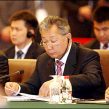
Bishkek Sees Yet Another Political Assassination
Publication: Eurasia Daily Monitor Volume: 6 Issue: 74
By:

As the presidential elections draw nearer, political assassinations and criminality are on the rise within Kyrgyzstan. On April 14, another Member of Parliament (MP) Sanjarbek Kydyraliyev, was shot dead outside his home in Bishkek. Kydyraliyev is the fifth MP killed in Kyrgyzstan since President Kurmanbek Bakiyev took power in March 2005. He belonged to the pro-regime party Ak Zhol.
In the past four years, five MP’s with alleged connections within the criminal underworld have been assassinated in Bishkek. The record of other political assassinations now extends to over a dozen, including the former presidential aide Medet Sadyrkulov, whose death in a suspicious car accident in March was the most recent example. According to Kyrgyz experts, Sadyrkulov was killed for expressing his intention to support the opposition forces.
Whether Kydyraliyev supported any of the political opposition leaders is unknown. However, his competition with local criminals across the country was obvious. Before being re-elected to parliament in the elections in December 2007, Kydyraliyev was confronted with assassination of Bayaman Erkinbayev, another victim of the political violence which has flourished during Bakiyev’s reign. Both MP’s were from southern Kyrgyzstan, and in their early thirties when assassinated. Their business interests conflicted, while they also allegedly controlled groups of martial arts fighters and criminals.
In particular, their interests clashed over the Kara Suu regional bazaar in Osh oblast. Criminal groups and influential politicians were also involved in these showdowns. In January 2007, the head of the bazaar and close ally of Kydyraliyev, was assassinated along with several of his employees. The competition over the control of the bazaar continued between Kydyraliyev and Erkinbayev’s widow, as well as his fellow MP’s Arapbai Tolonov and Aliyar Abzhaliyv (www.akipress.kg, March 2, 2007). In addition to hosting trade from Kyrgyz, Uzbek and Tajik entrepreneurs, the bazaar is known for serving as a transit route for smuggling Afghan heroin.
The increase in political assassinations testifies to the nefarious ties between the state and the criminal underworld. Under the previous regime led by Askar Akayev, criminal groups and state institutions coexisted as two separate phenomena, with both politicians and criminals collaborating whenever their interests coincided. With Bakiyev in power, however, not only were criminal leaders used in political confrontations, but several notorious criminals were able to gain acquittals from earlier charges and even penetrate the state institutions. In return for legalizing their status and legitimizing their shady business activities, they gave their support to the president.
One such example of the state-crime nexus was demonstrated in the case of an infamous criminal leader Rysbek Akmatbayev, who was able to get acquitted of triple homicide and then secured his election to parliament in April 2006. Akmatbayev was assassinated the following month by an unknown assailant. His brother, also serving within the parliament, was killed in a prison riot in October 2005. As one Kyrgyz former security officer commented to Jamestown, over time Akmatbayev’s influence on the Bakiyev regime changed from being a mere supporter to becoming a greater authority.
According to the opposition leader Azimbek Beknazarov, Kydyraliyev held a lot of secrets on the current regime (www.azattyk.kg, April 14). The leader compared the motives of Kydyraliyev’s assassins to those of Sadyrkulov’s, saying that the regime no longer needs influential and fearless politicians like these. Yet, Bakytbek Beshimov, another opposition leader and one of the potential presidential candidates, argues that although Kydyrmashev’s death was likely a result of a political confrontation, it is not linked to the upcoming presidential elections (www.akipress.kg, April 15).
In the meantime, the fate of another MP from the Social Democratic Party, Ruslan Shabatoyev, remains unknown. He mysteriously disappeared in September 2008 and police have not yet located him (www.24.kg, April 14). The case of Shabatoyev remained in the news for a few weeks, but after several months few, apart from his family, publicly raise the issue.
Political assassinations are becoming routine, according to some Kyrgyz experts. The public is becoming indifferent towards these criminal incidents involving the deaths of political figures or the beatings of journalists. Furthermore, the Ministry of Interior has been actively denying that any recent assassination was politically motivated. The regime’s reliance on criminal groups is alarming given that the presidential elections are nearing. Several members of the Ata Meken opposition party warned the public that any leader planning to stand against Bakiyev in the elections will risk their lives. Therefore, the opposition candidates must conduct their campaigns under enormous pressures not only from the regime itself, but also the criminal underworld.




